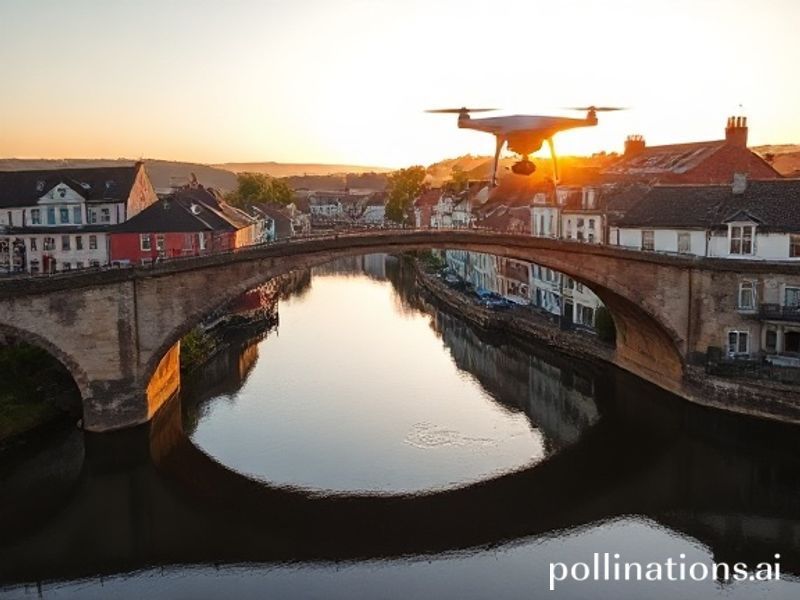Ross-on-Wye: The Quaint Town Quietly Prepping for the End of the World
Ross-on-Wye: The World’s Most Politely Apocalyptic Town
By “Dave’s Locker” Global Affairs Desk
If the planet ever opts for a soft landing into oblivion, it will probably do so in Ross-on-Wye, a riverside confection in Herefordshire whose half-timbered Tudor façades look like they were assembled by a Brexit-era IKEA, complete with missing democratic screws. From the vantage point of a war-scarred Kyiv balcony or a flood-soaked Jakarta suburb, Ross-on-Wye appears less a town than an international thought experiment: What happens when a society achieves peak quaintness and then tries to pay its gas bill with artisanal chutney?
Global elites—those Davos-casual types who helicopter between climate summits and private islands—have begun whispering about the “Ross Model.” On paper, it is a masterclass in low-impact living: farmers’ markets that still accept cash, zero high-rise ambition, and a carbon footprint so light it practically floats above the River Wye like an apology. Off paper, it is a town where the average resident believes “supply-chain disruption” is the queue at the local fish-and-chip shop, and where the only thing being mined is nostalgia.
Yet the world keeps Ross on speed dial, because the town has become a Rorschach test for late-capitalist anxiety. Chinese property developers fly in to photograph pastel storefronts for “heritage-themed” malls in Chengdu. Silicon Valley VCs tour the antique bookshops muttering about “slow tech” and “mindful disconnection,” then sprint back to the nearest 5G mast before withdrawal symptoms set in. Even the Kremlin has reportedly studied Ross’s Sunday-market economy as a possible post-sanctions template—though imagining Vladimir Putin haggling over organic sourdough feels like casting Genghis Khan in a Jane Austen reboot.
The international significance crystallised last autumn when Ross-on-Wye accidentally exported a crisis. A routine batch of local cider—fermented in barrels older than most nation-states—tested positive for trace explosives. Panic ricocheted from Brussels to Washington: Was al-Qaeda franchising in the Cotswolds? The culprit turned out to be fertilizer residue from a neighbouring allotment. Still, the UN Security Council held an emergency session titled “Alcoholic Beverages as Dual-Use Technology,” proving that in 2023 even quaintness can be weaponised.
Meanwhile, climate refugees eye the town with the weary calculation of people who have already lost everything. Bangladeshi farmers watch drone footage of Ross’s flood-defence meadows and wonder why the planet’s most vulnerable must learn to swim while the fortunate perfect their garden gnome placement. The town’s answer, delivered in soothing BBC Received Pronunciation, is “adaptive resilience”—a phrase that sounds like a yoga pose but functions as moral insulation.
Economically, Ross-on-Wye is a living hedge fund: property prices inflated by Londoners fleeing their own turbocharged dystopia. Georgian townhouses now trade like NFTs—useless in a crisis but reassuringly expensive. The irony, of course, is that every hedge eventually meets a chainsaw. The Wye itself, once painted by Turner and now photographed by Japanese honeymooners, is clinically obese with agricultural runoff. Wild swimmers emerge from its waters looking like they’ve been marinated in liquidised bureaucracy.
And yet, the town persists, cheerfully rearranging deckchairs on what may or may not be the Titanic. Its residents—retired colonels, artisanal cheesemakers, and disgraced bankers growing heritage tomatoes—have perfected the art of smiling apocalypse. When the local council announced a “climate emergency,” the biggest debate was whether the declaration should be printed on recycled paper or simply chalked on the pavement outside Ye Olde Tea Shoppe. Democracy, like the pastries, remains flaky.
So what does Ross-on-Wye tell the rest of us, sweating through heat domes and currency collapses? Perhaps that the end of the world will not come with a bang but with a polite throat-clearing and an invitation to the church fête. It will have homemade jam, tasteful bunting, and absolutely no Wi-Fi—because civilisational suicide is easier if you can’t Google the symptoms.
In the meantime, the planet’s power brokers will continue to treat Ross as both lifeboat and souvenir. They’ll photograph its medieval streets, monetise its authenticity, and fly home before the next flood warning. And the town will wave them off with that uniquely British blend of courtesy and contempt, secure in the knowledge that when the rest of us are up to our necks in rising seawater, Ross-on-Wye will still be arguing about the correct pronunciation of “scone.”
The world ends; the cream tea must go on.







